List of presidents of Colombia

Under the Colombian Constitution of 1991, the president of Colombia is the head of state and head of government of the Republic of Colombia. As chief of the executive branch and head of the national government as a whole, the presidency is the highest political office in Colombia by influence and recognition. The president is also the commander-in-chief of the Military Forces of Colombia. The president is directly elected to a four-year term in a popular election. Since the passing of the Legislative Act 2 of 2004, no person may be elected president more than twice.[1] In 2015, a constitutional amendment repealed the 2004 changes and reverted to the original one-term limit.[2] Upon the death, resignation, or removal from office of an incumbent president, the vice president assumes the office. The president must be at least 30 years of age and a "natural born" citizen of Colombia.
List of Presidents during the War of Independence
[edit]Pre-independence period (1810–1819)
[edit]Although Colombia has historically been considered an independent country since 1819, the quality of "president" of Colombia of the leaders who governed the current South American country before the Independence of Spain was consolidated is equally accepted. The following is a list of those rulers prior to 1819, considered official by various sources in the country such as the Museum of the Bank of the Republic.
The following were the leaders who exercised executive power during the First Republic, either as presidents of the Supreme Junta of Santa Fe (1810–1811), presidents of the State of Cundinamarca (1811–1814) (in red) or presidents of the Congress of the United Provinces of New Granada (1811–1816), the last two states in dispute.
Supreme Governing Junta of Santa Fe in New Granada (1810–1811)
[edit]| No. | Portrait | Name (Birth–Death) |
Elected | Took office | Left office | Time in office | Political party | Monarch |
|---|---|---|---|---|---|---|---|---|
| 1 | 
|
Antonio José Amar y Borbón (1742–1826) [3] |
1810 | 20 July 1810 | 25 July 1810 | 5 days | None (Royalist) |
Ferdinand VII (de jure) |
| 2 | 
|
José Miguel Pey (1763–1838) |
1810 | 25 July 1810 | 1 April 1811 | 250 days | None (Centralist) |
Ferdinand VII (de jure) |
Free and Independent State of Cundinamarca (1811–1814)
[edit]| No. | Portrait | Name (Birth–Death) |
Elected | Took office | Left office | Time in office | Political party | Acting presidents | Monarch |
|---|---|---|---|---|---|---|---|---|---|
| 1 | 
|
Jorge Tadeo Lozano (1771–1816) |
1811 | 1 April 1811 | 29 September 1811 | 181 days | None (Centralist) |
None | Ferdinand VII (de jure: 1811–1813) |
| 2 | 
|
Antonio Nariño (1765–1823) |
1811 | 30 September 1811 | 13 August 1813 | 1 year, 317 days | None (Centralist) |
Manuel Benito de Castro (25 June 1812–5 August 1812) |
Ferdinand VII (de jure: 1811–1813) |
| Luís de Ayala y Vergara (25 June 1812–5 August 1812) | |||||||||
| Felipe de Vergara Azcárate (26 November 1812–14 December 1812) | |||||||||
| José María Arrubla (26 November 1812–13 December 1812) | |||||||||
| None | None (Independence: 1813–1814) | ||||||||
| 3 | 
|
Manuel Bernardo Álvarez (1743–1816) |
1813 | 13 August 1813 | 12 December 1814 | 1 year, 121 days | None (Centralist) |
None | None (Independence: 1813–1814) |
United Provinces of New Granada (1811–1816)
[edit]
| No. | Portrait | Name (Birth–Death) |
Took office | Left office | Time in office |
|---|---|---|---|---|---|
| 1 |  |
José Miguel Pey | 25 July 1810 | 1 April 1811 | 250 days |
| 2 |  |
Jorge Tadeo Lozano | 24 March 1811 | 29 September 1811 | 189 days |
| 3 |  |
Antonio Nariño y Álvarez | 30 September 1811 | 27 October 1812 | 1 year, 27 days |
| - | Pedro Groot y Alea | 23 December 1811 | 24 December 1811 | 1 day | |
| 4 | Luis de Ayala y Vergara | 25 June 1812 | 5 August 1812 | 41 days | |
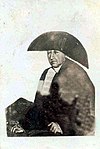 |
Manuel Benito de Castro Arcaya | 19 August 1812 | 12 September 1812 | 24 days | |
| 5 |  |
Antonio Nariño y Álvarez
& State Council |
27 October 1812 | 31 August 1813 | 308 days |
| 6 | José María Arrubia y Martínez | 26 November 1812 | 14 December 1812 | 18 days | |
| Juan Dionisio Gamba y Ureña | 26 November 1812 | 14 December 1812 | 18 days | ||
 |
Felipe de Vergara Azcárate y Caycedo | 26 November 1812 | 14 December 1812 | 18 days | |
| 7 |  |
Manuel de Bernardo Álvarez | 13 August 1813 | 12 December 1814 | 1 year, 121 days |
| 8 |  |
Camilo Torres Tenorio | 27 October 1812 | 5 October 1814 | 1 year, 343 days |
| 9 | Triumvirate | 5 October 1814 | 15 November 1815 | ||
| José María del Castillo y Rada | 5 October 1814 | 25 January 1815 | 112 days | ||
 |
José Fernández Madrid | 5 October 1814 | 25 January 1815 | 112 days | |
 |
José Joaquín Camacho | 5 October 1814 | 25 January 1815 | 112 days | |
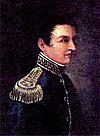 |
Custodio García Rovira | 26 November 1814 | 25 March 1815 | 119 days | |
 |
José Miguel Pey | 25 March 1815 | 15 November 1815 | 235 days | |
 |
Manuel Rodríguez Torices | 28 July 1815 | 15 November 1815 | 110 days | |
 |
Crisanto Valenzuela | 25 July 1815 | 17 August 1815 | 23 days | |
 |
Antonio Villavicencio y Verastegui | 17 August 1815 | 15 November 1815 | 90 days | |
| 10 |  |
Camilo Torres Tenorio | 15 November 1815 | 14 March 1816 | 120 days |
| 11 |  |
José Fernández Madrid | 14 March 1816 | 22 June 1816 | 100 days |
| 12 | 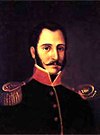 |
Liborio Mejía Gutiérrez | 22 June 1816 | 30 June 1816 | 8 days |
| 13 |  |
Custodio García Rovira | 30 June 1816 | 10 July 1816 | 10 days |
| 14 |  |
Fernando Serrano Uribe | 16 July 1816 | 16 September 1816 | 62 days |
| Spain Retakes the Territory | 1816 | 1819 |
Official List of Presidents
[edit]Republic of Colombia (1819–1831)
[edit]
This list includes those persons who were sworn into or forcibly took the office of president of the Republic of Colombia following the passing of the Colombian Constitution of Cúcuta, which took effect on 30 August 1821. The Republic of Colombia of 1821–1831 is now commonly referred to as the Gran Colombia to differentiate it from the present-day Republic of Colombia. Gran Colombia was the union of the territories that comprised the Viceroyalty of the New Granada under the uti possidetis principle, and it included the political entities that had formed in the New Granada after the initial wars of independence of 1810 against the Kingdom of Spain under King Joseph I; those included the Second Republic of Venezuela, the United Provinces of New Granada, the Presidency of Quito, and the Royal Audiencia of Panama.

The presidency dates back to the Congress of Angostura. This quasi-constituent assembly was formed to lay the ground work for a self-ruled governing administration after independence. The Constituent Assembly was formed by regional leaders that represented areas under rebel control; these areas did not include parts of what is now Colombia, as those areas were still under Spanish control, but aimed to legislate on its behalf. Congress elected an interim-executive officer and vested this figure with the title of president. Chosen to be first president of Colombia, was General Simón Bolívar y Palacios, leader of the revolutionary forces, who up to that point was titled "Supreme Chief" for his role in the revolution. The following day, Congress elected Francisco Antonio Zea Díaz, first vice president of Colombia. Bolívar was subsequently re-elected interim president by the Angostura Assembly on 17 December 1819 after Colombia was conquered following the Battle of Boyacá, and elected again in 1821 in a permanent interim basis, pending national elections, by the Congress of Cúcuta, another constituent assembly mandated by the Angostura Assembly, and this time with elected officials representing the Colombian territories, during this time, and until 1826, the executive power was entrusted to the vice president Francisco de Paula Santander y Omaña, while Bolívar was away in battle fighting to liberate Spanish colonies in Bolivia, and Peru. Bolívar was formally elected in a national election in 1826 for a period of four years, but on 27 August 1828, Bolívar declared martial law and assumed dictatorship style powers after the Congress of Ocaña failed to pass a new constitution. Bolívar eventually relinquished power in 1830, and Congress elected Joaquín de Mosquera y Arboleda as his successor, but was shortly deposed by General Rafael Urdaneta y Faría who hoped Bolívar would once again re-take power, but Bolívar not only declined the presidency, but also shortly died, leaving Urdaneta with no mandate for power. Urdaneta ceded executive-power to the vice president Domingo Caycedo y Sanz de Santamaría, as Congress had impeached Mosquera for his failure to prevent the coup; during this time, and until 1832 the presidency remained vacant as there was no law for succession of power. In 1832, former vice president Santander was elected by Congress as president of Gran Colombia, and it would be the last, since the territories of Venezuela and Ecuador broke away, which prompted the drafting of a new constitution.
| No. [n 1] |
Portrait | Name (Birth–Death) |
Elected | Took office | Left office | Time in office | Political party | Vice President | Acting presidents[n 2] |
|---|---|---|---|---|---|---|---|---|---|
| 1 | 
|
Simón Bolívar y Palacios [4] |
1819 | 15 February 1819 | 4 May 1830 [n 3] |
11 years, 78 days | Independent | Francisco Antonio Zea Díaz (16 February 1819–21 March 1820)[n 3] |
 (13 December 1821–14 November 1826) Estanislao Vergara y Sanz de Santamaría (10 November 1829–10 December 1829)  |
| Juan Germán Roscio Nieves (21 March 1820–10 March 1821)[n 4] | |||||||||
| vacant (10 March 1821–4 April 1821) | |||||||||
| Antonio Nariño y Álvarez (4 April 1821–6 June 1821)[n 3] | |||||||||
| José María del Castillo y Rada (6 June 1821–3 October 1821) | |||||||||
| 1821 | Francisco de Paula Santander y Omaña (3 October 1821–27 August 1828) | ||||||||
| 1825 | Francisco de Paula Santander y Omaña (3 October 1821–27 August 1828) | ||||||||
| vacant (27 August 1828– 4 May 1830) | |||||||||
| 2 | 
|
Joaquín de Mosquera y Arboleda [5] |
1830 | 4 May 1830 | 4 September 1830 | 123 days | Independent | Domingo Caycedo y Sanz de Santamaría (4 May 1830–4 September 1830) |
 (4 May 1830–15 June 1830) (2 August 1830–18 August 1830) |
| 3 | 
|
Rafael Urdaneta y Faría [6] |
4 September 1830 [n 5] |
30 April 1831 | 238 days | Independent | suspended (4 September 1830–30 April) |
||
| vacant | 30 April 1831 | 10 March 1832 | no party |  Caycedo y Sanz de Santamaría (30 April 1831–21 November 1831) | |||||
 Obando del Campo (21 November–10 March 1832) | |||||||||
| 4 | 
|
Francisco de Paula Santander y Omaña [7] |
1832 | 10 March 1832 | 1 April 1837 | 5 years, 22 days | no party | José Ignacio de Márquez Barreto (10 March 1832–1 April 1833) |
José Ignacio de Márquez Barreto (10 March 1832–7 October 1832) |
Republic of New Granada (1832–1858)
[edit]This list includes those persons who were sworn into or forcibly took the office of president of the Republic of New Granada following the passing of the Colombian Constitution of 1832, which took effect on 26 November 1832.
There were 8 people in office serving a presidency each. All were popularly elected under an electoral college system except one, José María Melo y Ortiz who took power by mounting a coup d'état. Francisco de Paula Santander y Omaña, the first president, served initially on a provisional basis but in 1833 began a regular four-year term as president of the Republic of New Granada, to which he was popularly elected. Santander spent the longest time in office with 5 years and 22 days. José María Obando del Campo spent the shortest time in office with just 1 year and 6 days before being deposed.
The president and the vice president were elected separately two years apart for a period of four years each, resulting in a president having two vice presidents given normal circumstances. The Colombian Constitution of 1832, just like its predecessor, did not provide for a way to fill a vacancy in the presidency or the vicepresidency until the next electoral period, because of this the presidency was vacant between 1854 and 1857 when Melo, who had deposed President Obando in a coup, handed power to the previous administration; Obando would have taken back the presidency, but he had been impeached by Congress and hence there was no president to take power. During this time Vice President José de Obaldía y Orejuela served as acting president until the end of his term, at which point the newly elected vice president Manuel María Mallarino Ibargüen served as acting president for the remainder of the term Obando had been elected for until 1857 when Mariano Ospina Rodríguez was elected. The vice presidency was also vacant between 1837 and 1839, when Vice President José Ignacio de Márquez Barreto was elected president and the post remained vacant until the next vice presidencial election in 1839.
- Political parties
| No. [n 1] |
Portrait | Name (Birth–Death) |
Elected | Took office | Left office | Time in office | Political party | Vice President | Acting presidents[n 2] |
|---|---|---|---|---|---|---|---|---|---|
| 1 | 
|
Francisco de Paula Santander y Omaña (1792–1840) [8] |
1832 | 10 March 1832 | 1 April 1837 | 5 years, 22 days | Independent | José Ignacio de Márquez Barreto (10 March 1832–1 April 1833) |
José Ignacio de Márquez Barreto (10 March 1832–7 October 1832) |
| 1833 | Joaquín Mariano Mosquera y Arboleda (1 April 1833–1 April 1835) | ||||||||
| José Ignacio de Márquez Barreto (1 April 1835–1 April 1837) | |||||||||
| 2 | 
|
José Ignacio de Márquez Barreto (1793–1880) [9] |
1837 | 1 April 1837 | 1 April 1841 | 4 years | Independent (Ministerials) |
vacant (1 April 1837–1 April 1839) |
|
| Domingo Caycedo y Sanz de Santamaría (1 April 1839–1 April 1843) | |||||||||
| 3 | 
|
Pedro Alcántara Herrán Martínez (1800–1872) [10] |
1841 | 1 April 1841 | 1 April 1845 | 4 years | Independent (Ministerials) |
Juan de Dios Aranzazu González (5 July 1841–19 May 1842) | |
| Joaquín José Gori y Álvarez de Castro (1 April 1843–1 April 1847) | |||||||||
| 4 | 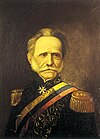
|
Tomás Cipriano de Mosquera y Arboleda (1798–1878) [11] |
1845 | 1 April 1845 | 1 April 1849 | 4 years | Independent (Ministerials) |
Rufino Cuervo y Barreto (14 August 1847–14 December 1847) | |
| Rufino Cuervo y Barreto (1 April 1847–1 April 1851) | |||||||||
| 5 | 
|
José Hilario López Valdéz (1798–1869) [12] |
1849 | 1 April 1849 | 1 April 1853 | 4 years | Liberal | ||
| José de Obaldía y Orejuela (1 April 1851–1 April 1855) | |||||||||
| 6 | 
|
José María Obando del Campo (1795–1861) [13] |
1853 | 1 April 1853 | 17 April 1854 | 1 year, 16 days | Liberal | ||
| 7 | 
|
José María Melo y Ortiz (1800–1860) [14] |
— | 17 April 1854 [n 5] |
4 December 1854 | 231 days | Liberal (Draconians) |
Francisco Antonio Obregón Muñoz (20 May 1854–2 June 1854) | |
| vacant | 4 December 1854 | 1 April 1857 | José de Obaldía y Orejuela (5 August 1854–1 April 1855) Manuel María Mallarino Ibargüen (1 April 1855–1 April 1857) | ||||||
| Manuel María Mallarino Ibargüen (1 April 1855–1 April 1859) | |||||||||
| 8 | 
|
Mariano Ospina Rodríguez (1805–1885) [15] |
1857 | 1 April 1857 | 1 April 1861 | 4 years | Conservative | ||
| [n 6] | |||||||||
Granadine Confederation (1858–1863)
[edit]This list includes those persons who were sworn into, succeeded to, or forcibly took office as President of the Granadine Confederation following the passing of the Colombian Constitution of 1858, which took effect on 22 May 1858.
The Constitution of 1858 abolished the Office of the Vice Presidency. The line of succession was modified by the introduction of the figures of 1st, 2nd, and 3rd Presidential Designates, who were elected annually by Congress amongst its members, but held no office or duties other than providing a succession to the presidency in the event of the president's temporal or permanent absence.
There were only 3 people in office who served a presidency each. Mariano Ospina Rodríguez initially took office in 1857 as the 8th and last president of the Republic of New Granada. In 1861 Julio Arboleda Pombo became the first person to be elected President of the Granadine Confederation under the new electoral college system set up by the new constitution, however during this time the country was going through a civil war and Congress was closed down. Furthermore, according to the new constitution the president had to take office before Congress; since this couldn't happen, Pombo could not take office and did not become the president. When Ospina's term ended on 1 April 1861, with no congress to swear in the elected president, the power would have been transferred to one of the Presidential Designates, however with Congress closed down no designates were elected for that year, and with no designates to succeed Ospina, the presidency was handed out to the next person in the line of succession which was the Inspector General, Bartolomé Calvo Díaz. Calvo's presidential tenure was short; within three months of holding the post, General Tomás Cipriano de Mosquera y Arboleda, leader of the Liberal forces, marched into Bogotá deposing Calvo in a coup d'état.
Giving the great animosity between Conservatives and Liberals at the time of the 1860-62 civil war, another thing that marked this period in regards to the presidency was that there were multiple attempts to undermine the government in power by laying claims on the presidency using various arguments. The first one of these was the Liberal General Juan José Nieto Gil, who claimed the presidency by disregarding the legitimacy of Ospina and claiming power in virtue of being the second presidential designate; he finally ceded power to his fellow Liberal General, Mosquera, when he took power in Bogotá. Mosquera had also claimants to the presidency in opposition to him. Julio Arboleda Pombo who was elected president but could not take office was appointed inspector general by President Calvo when he was in power, thus when Mosquera captured him, Arboleda claimed the presidency as the next in theline of succession to Calvo, even though that by this time the government and city had fallen, and the Conservative administration had fled the capital. After Arboleda was also captured by Mosquera a few days after Calvo was taken prisoner, the Secretary of Finance, Ignacio Gutierrez Vergara, succeeded Arboleda to the claimed presidency as next in the line of succession being the oldest government secretary of the previous administration. When Gutiérrez was captured by Mosquera, the next in line of succession by age was the Secretary of Government and War, General Leonardo Canal González. As pretender to presidency, he moved the capital of the nation to Pasto, where he led the Conservative Government in exile. In 1862 Canal left to fight the Liberal forces and left Manuel del Río y de Narváez, his Secretary of Government and War, as acting president of the government-in-exile. This struggle for power all came to an end in 1863 when del Río finally capitulated to Mosquera presenting the surrender of the government-in-exile and recognising the presidency of Mosquera bringing the civil war to an end.
- Political parties
| No. [n 1] |
Portrait | Name (Birth–Death) |
Elected | Took office | Left office | Time in office | Political party | Vice President | Acting presidents[n 2] | Acting in Rebellion |
|---|---|---|---|---|---|---|---|---|---|---|
| 1 | 
|
Mariano Ospina Rodríguez (1805–1885) [15] |
1857 | 1 April 1857 | 1 April 1861 | 4 years | Conservative | [n 6] | Juan José Nieto Gil (25 January 1861–18 July 1861) | |
| 2 | 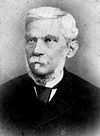
|
Bartolomé Calvo Díaz (1815–1889) [16] |
1861 | 1 April 1861 | 18 July 1861 | 108 days | Conservative | [n 6] | ||
| 3 | 
|
Juan José Nieto Gil
(1804–1866) |
— | 25 January 1861 | 18 July 1861 | 174 days | Liberal | |||
| 4 | 
|
Tomás Cipriano de Mosquera y Arboleda (1798–1878) [11] |
— | 18 July 1861 [n 5] |
4 February 1863 | 1 year, 201 days | Liberal | [n 6] | Andrés Cerón Serrano (February 1862–February 1862) |
Julio Arboleda Pombo (10 July 1861–18 July 1861)  Ignacio Gutiérrez Vergara (18 July 1861–18 January 1862) Leonardo Canal González (18 July 1861–6 November 1862) Manuel del Río y de Narváez (6 November 1862–13 January 1863) |
United States of Colombia (1863–1886)
[edit]This list includes those persons who were sworn into, succeeded to, or forcibly took office as President of the United States of Colombia following the passing of the Colombian Constitution of 1863, which took effect on 8 May 1863.
There were 11 people in office, and 14 presidencies as three presidents served two non-consecutive terms each and are counted chronologically twice, they are: Tomás Cipriano de Mosquera y Arboleda, Manuel Murillo Toro, and Rafael Núñez Moledo, the last two having actually been elected twice. Out of the 11 individuals in office, 9 were elected, one succeeded to the presidency (José Eusebio Otálora Martínez), and one took the presidency by mounting a coup d'état (Santos Acosta Castillo). Only one president died in office from natural causes (Francisco Javier Zaldúa y Racines).
Tomás Cipriano de Mosquera y Arboleda, the first president of the United States of Colombia, had actually started his tenure in 1861 (he became the third and last president of the Granadine Confederation with a coup). In this capacity he was appointed by the National Constituent Assembly of 1863 to continue serving while the assembly drafted, passed, signed, and implemented a new constitution. The first elected president of the United States of Colombia was Manuel Murillo Toro, elected in 1864 for a constitutional two-year term. The longest serving president was Rafael Núñez Moledo with 10 years, 5 months, and 17 days, of which only 2 years, 4 months, and 5 days were actually served as the elected president of the United States of Colombia, but still longer than anyone else. Francisco Javier Zaldúa y Racines spent the shortest time in office with just 8 months, and 20 days in 1882.
The Colombian Constitution of 1858 had effectively abolished the vice presidency, and introduced a new line of succession system featuring the figures of first, second, and third Presidential designates. These designates were elected annually by Congress amongst its members, but held no office or duties other than providing a succession for the president in the event of the resident's temporal or permanent absence. Both changes to vice presidency and presidential designates were kept by the Colombian Constitution of 1863. This system of succession was implemented in 1882 when President Zaldúa died in office and the third presidential designate, Clímaco Calderón Reyes, became acting president while the first presidential designate, Rafael Núñez Moledo, took office, however Núñez turned down the presidency and therefore the second presidential designate, José Eusebio Otálora Martínez, succeeded Zaldúa to presidency.
- Political parties
| No. | Portrait | Name (Birth–Death) |
Elected | Took office | Left office | Time in office | Political party | Vice President[n 7] | Acting presidents |
|---|---|---|---|---|---|---|---|---|---|
| 1 | 
|
Tomás Cipriano de Mosquera y Arboleda (1798–1878) [11] |
1860 | 14 May 1863 | 1 April 1864 | 323 days | Liberal (Radical) |
Juan Agustín de Uricoechea y Rocha (29 January 1864–28 February 1864) | |
| 2 | Manuel Murillo Toro (1816–1880) [17] |
1864 | 1 April 1864 | 1 April 1866 | 2 years | Liberal (Radical) |
|||
| 3 | 
|
Tomás Cipriano de Mosquera y Arboleda (1798–1878) [11] |
1866 | 1 April 1866 | 23 May 1867 | 1 year, 52 days | Liberal (Moderate) |
José María Rojas Garrido (1 April 1866–22 May 1866) | |
| 4 | 
|
Santos Acosta Castillo (1828–1901) [18] |
— | 23 May 1867 [n 5] |
1 April 1868 | 314 days | Liberal (Radical) |
||
| 5 | 
|
Santos Gutiérrez Prieto (1820–1872) [19] |
1868 | 1 April 1868 | 1 April 1870 | 2 years | Liberal (Radical) |
Salvador Camacho Roldán (21 December 1868–2 January 1869) | |
| 6 | 
|
Eustorgio Salgar Moreno (1831–1885) [20] |
1870 | 1 April 1870 | 1 April 1872 | 2 years | Liberal (Radical) |
||
| 7 | Manuel Murillo Toro (1816–1880) [21] |
1872 | 1 April 1872 | 1 April 1874 | 2 years | Liberal (Radical) |
|||
| 8 | 
|
Santiago Pérez de Manosalbas (1830–1900) [22] |
1874 | 1 April 1874 | 1 April 1876 | 2 years | Liberal (Radical) |
||
| 9 | 
|
Aquileo Parra Gómez (1825–1900) [23] |
1876 | 1 April 1876 | 1 April 1878 | 2 years | Liberal (Radical) |
José Sergio Camargo Pinzón (19 May 1877–14 August 1877) Manuel María Ramírez Fortoul (22 December 1877–24 December 1877) | |
| 10 | 
|
Julián Trujillo Largacha (1828–1883) [24] |
1878 | 1 April 1878 | 1 April 1880 | 2 years | Liberal (Radical) |
||
| 11 | 
|
Rafael Núñez Moledo (1825–1894) [25] |
1880 | 1 April 1880 | 1 April 1882 | 2 years | Liberal (Independent) |
||
| 12 | 
|
Francisco Javier Zaldúa y Racines (1811–1882) [26] |
1882 | 1 April 1882 | 21 December 1882 [n 4] |
264 days | Liberal (Independent) |
||
| 13 | 
|
José Eusebio Otálora Martínez (1826–1884) [27] |
— | 21 December 1882 | 1 April 1884 | 1 year, 102 days | Liberal (Independent) |
Clímaco Calderón Reyes (21 December 1882– 22 December 1882) | |
| 14 | 
|
Rafael Núñez Moledo (1825–1894) [25] |
1884 | 1 April 1884 | 1 April 1886 | 2 years | Liberal (Independent) |
Ezequiel Hurtado Hurtado (1 April 1884– 11 August 1884) José María Campo Serrano (1 April 1886– 7 August 1886) | |
Republic of Colombia (1886–present)
[edit]This list includes those persons who were sworn into, succeeded to, or forcibly took office as president of the present-day Republic of Colombia following the passing of the Colombian Constitution of 1886, which took effect on 6 August 1886. For Colombian leaders before this, see the above lists.
There have been 31 people in office, and 32 presidencies as Alfonso López Pumarejo served two non-consecutive terms and is counted chronologically as both the 14th and 16th president. Out of the 31 individuals in office, 26 were elected president, three succeeded to the presidency (Miguel Antonio Caro Tobar, Ramón González Valencia and Jorge Holguín Mallarino), two took the presidency by mounting a coup d'état (José Manuel Marroquín Ricaurte and Gustavo Rojas Pinilla against Manuel Antonio Sanclemente Sanclemente and Laureano Gómez Castro respectively), two permanently resigned from office (Rafael Reyes Prieto and Marco Fidel Suárez) and one died in office of natural causes (Rafael Núñez Moledo).
Rafael Núñez Moledo, the first president, was actually inaugurated in 1884 as the 14th and last president of the United States of Colombia for a two-year constitutional term; in this capacity he was appointed by the National Constituent Assembly of 1885 to serve a new six-year term while the assembly drafted, passed, signed, and implemented a new constitution; at the end of this term he was elected in 1892 for his first constitutional six-year term as president of Colombia. Núñez spent the longest time in office with 10 years, 5 months, and 17 days, but having only spent 2 years, 1 month, and 11 days as the elected president of Colombia before his death. The longest serving elected president was Álvaro Uribe Vélez with 8 years between 2002 and 2010 having been re-elected for a second term in 2006. Ramón González Valencia spent the shortest time in office with just 1 year between 1909 and 1910 when he was elected by Congress to finish the term that President Rafael Reyes Prieto had resigned to. The shortest serving elected president was Manuel Antonio Sanclemente Sanclemente with 1 year, 11 months, and 24 days before he was deposed. Carlos Eugenio Restrepo Restrepo, was the first president to serve under the new four-year constitutional term after the Constitutional Reform of 1910 when he was appointed president by that year's National Constituent Assembly; the first elected president to serve the four-year constitutional term would be his successor, José Vicente Concha Ferreira elected in 1914. Eduardo Santos Montejo was the first to be elected by men of all classes in 1938 after all land-ownership and literacy restrictions were repealed by the Constitutional Reform of 1936. Alberto Lleras Camargo in 1958 became the first president elected after women gained voting rights after the Constitutional Reform of 1954.
The vice presidency was abolished after the Constitutional Reform of 1905 and was only re-introduced after the passing of the Colombian Constitution of 1991 which remains in place. Article 127 of the Colombian Constitution of 1886 only allowed for re-election of the president in a non-immediate form; this was changed by the Constitutional Reform of 2005 allowing for immediate re-elections for a maximum of two terms.
Under the Colombian Constitution of 1991, the President of Colombia is the head of state and head of government of the Republic of Colombia. As chief of the executive branch and head of the national government as a whole, the presidency is the highest political office in Colombia as measure by influence and recognition. The president is also the commander-in-chief of the military of Colombia. The president is directly elected to a four-year term in a popular election. The Legislative Act 2 of 2004 established that no person may be elected president more than twice,[1] allowing Álvaro Uribe and Juan Manuel Santos consecutive reelection in 2006 and 2014 respectively. Nonetheless, in 2015 Congress reformed the Constitution again and suppressed consecutive and non-consecutive presidential reelection.[28] Since 1991 Constitution it was established that if no presidential candidate obtain more than 50% of the popular vote a run-off vote is needed. Upon the death, resignation, or removal from office of an incumbent president, the vice president assumes the office. The president must be at least 30 years of age and a "natural born" citizen of Colombia.
- Political parties
| No. [n 1] |
Portrait | Name (Birth–Death) |
Elected | Took office | Left office | Time in office | Political party | Vice President | Acting presidents[n 2] |
|---|---|---|---|---|---|---|---|---|---|
| 1 | 
|
Rafael Núñez Moledo (1825–1894) [25] |
1886 | 1 April 1886 [n 8] |
18 September 1894 [n 8][n 4] |
8 years, 170 days | National | Eliseo Payán (7 August 1886–7 August 1892) |
José María Campo Serrano (7 August 1886–5 January 1887) Eliseo Payán Hurtado (5 January 1887–4 June 1887) (12 December 1887–8 February 1888) Carlos Holguín Mallarino (7 August 1888–7 August 1892) Miguel Antonio Caro Tobar (7 August 1892–21 September 1892) Antonio Basilio Cuervo Urisarri (16 January 1893–17 January 1893) |
| 1892 | Miguel Antonio Caro (7 August 1892–18 September 1894) | ||||||||
| 2 | 
|
Miguel Antonio Caro Tobar (1845–1909) [29] |
— | 18 September 1894 | 7 August 1898 | 3 years, 323 days | National | vacant (18 September 1894–7 August 1898) [n 9] |
Guillermo Quintero Calderón (12 March 1896– 17 March 1896) |
| 3 | 
|
Manuel Antonio Sanclemente Sanclemente (1814–1902) [30] |
1898 | 7 August 1898 | 31 July 1900 | 1 year, 358 days | National | José Manuel Marroquín (7 August 1898–31 July 1900) |
|
| 4 | 
|
José Manuel Marroquín Ricaurte (1827–1908) [31] |
— | 31 July 1900 [n 5] |
7 August 1904 | 4 years, 7 days | Conservative | vacant (31 July 1900–7 August 1904) [n 9] |
|
| 5 | 
|
Rafael Reyes Prieto (1849–1921) [32] |
1904 | 7 August 1904 | 27 July 1909 [n 3] |
4 years, 354 days | Conservative | Ramón González Valencia (7 August 1904–10 March 1905) [n 3][n 10] |
Diego Euclides de Angulo Lemos (16 March 1908– 16 April 1908) Jorge Holguín Mallarino (27 July 1909–4 August 1909) |
| [n 10] | |||||||||
| 6 | 
|
Ramón González Valencia (1851–1928) [33] |
— | 7 August 1909 | 7 August 1910 | 1 year | Conservative | [n 10] | |
| 7 | 
|
Carlos Eugenio Restrepo Restrepo (1867–1937) [34] |
1910 | 7 August 1910 | 7 August 1914 [n 11] |
4 years | Republican Union [n 12] |
[n 10] | |
| 8 | José Vicente Concha Ferreira (1867–1929) [35] |
1914 | 7 August 1914 | 7 August 1918 | 4 years | Conservative | [n 10] | ||
| 9 | 
|
Marco Fidel Suárez (1855–1927) [36] |
1918 | 7 August 1918 | 11 November 1921 [n 3] |
3 years, 96 days | Conservative | [n 10] | |
| 10 | 
|
Jorge Holguín Mallarino (1848–1928) [37] |
— | 11 November 1921 | 7 August 1922 | 269 days | Conservative | [n 10] | |
| 11 | 
|
Pedro Nel Ospina Vázquez (1858–1927) [38] |
1922 | 7 August 1922 | 7 August 1926 | 4 years | Conservative | [n 10] | |
| 12 | Miguel Abadía Méndez (1867–1947) [39] |
1926 | 7 August 1926 | 7 August 1930 | 4 years | Conservative | [n 10] | ||
| 13 | 
|
Enrique Olaya Herrera (1880–1937) [40] |
1930 | 7 August 1930 | 7 August 1934 | 4 years | Liberal | [n 10] | |
| 14 | 
|
Alfonso López Pumarejo (1886–1959) [41] |
1934 | 7 August 1934 | 7 August 1938 | 4 years | Liberal | [n 10] | |
| 15 | Eduardo Santos Montejo (1888–1974) [42] |
1938 | 7 August 1938 | 7 August 1942 | 4 years | Liberal | [n 10] | ||
| 16 | 
|
Alfonso López Pumarejo (1886–1959) [41] |
1942 | 7 August 1942 | 7 August 1945 [n 3] |
3 years | Liberal | [n 10] | Carlos Lozano y Lozano (9 October 1942–19 October 1942) Darío Echandía Olaya (16 May 1944–10 July 1944) |
| — | Alberto Lleras Camargo (1906–1990) [43] |
— | 7 august 1945 | 7 august 1946 | 1 year | Liberal | [n 10] | ||
| 17 | 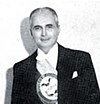
|
Mariano Ospina Pérez (1891–1976) [44] |
1946 | 7 August 1946 | 7 August 1950 | 4 years | Conservative | [n 10] | |
| 18 | Laureano Gómez Castro (1889–1965) [45] |
1949 | 7 August 1950 | 13 June 1953 | 2 years, 310 days | Conservative | [n 10] | Roberto Urdaneta Arbeláez (5 November 1951–13 June 1953) | |
| 19 | 
|
Gustavo Rojas Pinilla (1900–1975) [46] |
1954 | 13 June 1953 [n 5] |
10 May 1957 [n 3] |
3 years, 331 days | Military | [n 10] | Gabriel París Gordillo (30 July 1955–3 August 1955) |
| — | Military Junta | — | 10 May 1957 | 7 August 1958 | 1 year, 89 days | Military | [n 10] | Gabriel París Gordillo Rafael Navas Pardo Deogracias Fonseca Espinosa Rubén Piedrahíta Arango Luis Ernesto Ordóñez Castillo | |
| 20 | 
|
Alberto Lleras Camargo (1906–1990) [47] |
1958 | 7 August 1958 | 7 August 1962 | 4 years | Liberal [n 13] |
[n 10] | |
| 21 | 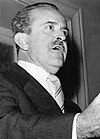
|
Guillermo León Valencia Muñoz (1909–1971) [48] |
1962 | 7 August 1962 | 7 August 1966 | 4 years | Conservative [n 13] |
[n 10] | José Antonio Montalvo Berbeo (6 August 1963–8 August 1963) |
| 22 | Carlos Lleras Restrepo (1908–1994) [49] |
1966 | 7 August 1966 | 7 August 1970 | 4 years | Liberal [n 13] |
[n 10] | ||
| 23 | Misael Pastrana Borrero (1923–1997) [50] |
1970 | 7 August 1970 | 7 August 1974 | 4 years | Conservative [n 13] |
[n 10] | Rafael Azuero Manchola (21 July 1973–24 July 1973) | |
| 24 | 
|
Alfonso López Michelsen (1913–2007) [51] |
1974 | 7 August 1974 | 7 August 1978 | 4 years | Liberal | [n 10] | Indalecio Liévano Aguirre (20 September 1975–24 September 1975) |
| 25 | 
|
Julio César Turbay Ayala (1916–2005) [52] |
1978 | 7 August 1978 | 7 August 1982 | 4 years | Liberal | [n 10] | Víctor Mosquera Chaux (3 February 1981–11 February 1981) |
| 26 | 
|
Belisario Betancur Cuartas (1923–2018) [53][54] |
1982 | 7 August 1982 | 7 August 1986 | 4 years | Conservative | [n 10] | |
| 27 | 
|
Virgilio Barco Vargas (1921–1997) [55][56] |
1986 | 7 August 1986 | 7 August 1990 | 4 years | Liberal | [n 10] | |
| 28 | 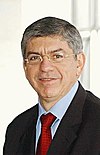
|
César Gaviria Trujillo (1947–) [57][58] |
1990 | 7 August 1990 | 7 August 1994 | 4 years | Liberal | [n 10] | |
| 29 | 
|
Ernesto Samper Pizano (1950–) [59][60] |
1994 | 7 August 1994 | 7 August 1998 | 4 years | Liberal | Humberto De la Calle (7 August 1994–19 September 1997) [n 10][n 3] |
Carlos Lemos Simmonds (11 January 1998–21 January 1998) |
| Carlos Lemos Simmonds (19 September 1997–7 August 1998) | |||||||||
| 30 | 
|
Andrés Pastrana Arango (1954–) [61][62] |
1998 | 7 August 1998 | 7 August 2002 | 4 years | Conservative | Gustavo Bell (7 August 1998–7 August 2002) |
|
| 31 | 
|
Álvaro Uribe Vélez (1952–) [63][64] |
2002 | 7 August 2002 | 7 August 2010 [n 14] |
8 years | Colombia First | Francisco Santos Calderón (7 August 2002–7 August 2010) |
|
| 2006 | |||||||||
| 32 | 
|
Juan Manuel Santos Calderón (1951–) [65][66] |
2010 | 7 August 2010 | 7 August 2018 | 8 years | National Unity | Angelino Garzón (7 August 2010–7 August 2014) |
|
| 2014 | German Vargas Lleras (7 August 2014–21 March 2017)[n 3] |
||||||||
| Óscar Naranjo (29 March 2017–7 August 2018) |
|||||||||
| 33 | 
|
Iván Duque Márquez (1976–) |
2018 | 7 August 2018 | 7 August 2022 | 4 years | Democratic Center | Marta Lucía Ramírez (7 August 2018–7 August 2022) |
|
| 34 | 
|
Gustavo Petro Urrego (1960–) |
2022 | 7 August 2022 | Incumbent | 2 years, 143 days | Humane Colombia (Historic Pact) |
Francia Márquez (7 August 2022–) |
|
Timeline
[edit]
See also
[edit]- List of vice presidents of Colombia
- List of presidential designates of Colombia
- List of viceroys of New Granada
Notes
[edit]- ^ a b c d For the purposes of numbering, a presidency is defined as an uninterrupted period of time in office served by one person. For example, Rafael Núñez Moledo served two consecutive terms and is counted as the first president (not the first and second). Upon the resignation of 5th president Rafael Reyes Prieto, Ramón González Valencia became the 6th president even though he simply served out the remainder of Reyes's second term and was never elected to the presidency in his own right. Alfonso López Pumarejo was both the 14th president and the 16th president, his two terms having been non-consecutive.
- ^ a b c d A period during which a vice-president, a designate, or a caretaker temporarily becomes Acting President under Article 193 of the 1991 Constitution, or before it, under Articles 124 and 125 of the 1886 Constitution, is not a presidency, because the president constitutionally remains in office during such a period.
- ^ a b c d e f g h i j Resigned.
- ^ a b c Died in office of natural causes.
- ^ a b c d e f Took power by coup d'état.
- ^ a b c d The Constitution of 1858 abolished the Office of the Vice President, the line of succession was modified placing the Government Ministers from oldest to youngest to succeed the President in the event of the President's temporal or permanent absence.
- ^ The Constitution of 1858 had abolished the Office of the Vice President, this decision was upheld by the Constitution of 1863, but the line of succession was modified differently by the introduction of the figures of 1st, 2nd, and 3rd Presidential Designates, who were elected annually by Congress amongst its members, but held no office or duties other than providing a succession for the President in the event of the president's temporal or permanent absence.
- ^ a b President Núñez had actually taken office on 1 April 1884 for a two year term as stipulated by Article 79 of the 1863 Constitution. In 1886, he was appointed by the National Constituent Council to serve a new six year term starting on 7 August 1886 as stipulated by Article A of the new 1886 Constitution that created the present-day Republic of Colombia. In 1892 he started his first elected term as president, the previous term having been an appointment to safeguard the passing and implementation of the new constitution and therefore was not in conflict with Article 127 of the 1886 Constitution that prohibited the immediate re-election of a president.
- ^ a b Prior to the abolishment of the Office of Vice President in 1905, Article 131 of the 1886 Constitution did not allow for a vacancy in the vice presidency to be filled until the end of the constitutionally elected term.
- ^ a b c d e f g h i j k l m n o p q r s t u v w x y z aa ab The Office of the Vice President was officially abolished by the 1905 National Constituent Assembly on 28 March 1905, and it was only reinstituted after the ratification of the new 1991 Constitution with Vice President de la Calle taking office after the following presidential elections in 1994.
- ^ The 1910 National Constituent Assembly amended Article 114 of the 1886 Constitution changing the length of a presidential term from that of six years to one of four years.
- ^ Although nominally head of the newly created Republican Union party, Restrepo was a long-time member of the Conservative Party.
- ^ a b c d Between 1958 and 1974 the presidency, under the National Front alternation plan, was held in an alternating manner by members of the two traditional parties: Liberals and Conservatives.
- ^ Álvaro Uribe Vélez is the first president to have been legally allowed to seek an immediate second term by the 2nd Legislative Act of 2004 that amended Article 197 of the 1991 Constitution. Before that, the 1886 Constitution allowed presidents to seek a second term only in non-consecutive periods.
References
[edit]- ^ a b Colombia, Congress of (27 December 2004). "Acto Legislativo 2 de 2004" [Legislative Act 2 of 2004]. Diario Oficial (in Spanish). 45 (775). Bogotá: National Printing Office. ISSN 0122-2112. OCLC 500057889. Archived from the original on 20 May 2012. Retrieved 23 November 2012.
- ^ "Constitución Política de 1991 (Artículo 197)". Secretaría General del Senado.
- ^ "Antonio Amar y Borbón". Enciclopedia Banrepcultural. Bank of the Republic (Colombia). 2 December 2024. Retrieved 2 December 2024.
- ^ "Biography of Rafael Núñez Moledo" (in Spanish). wsp.presidencia.gov.co. Archived from the original on 20 October 2013. Retrieved 15 November 2012.
- ^ "Biography of Rafael Núñez Moledo" (in Spanish). wsp.presidencia.gov.co. Archived from the original on 20 October 2013. Retrieved 15 November 2012.
- ^ "Biography of Rafael Urdaneta" (in Spanish). wsp.presidencia.gov.co. Archived from the original on 20 October 2013. Retrieved 15 November 2012.
- ^ "Biography of Francisco de Paula Santander" (in Spanish). wsp.presidencia.gov.co. Archived from the original on 20 October 2013. Retrieved 15 November 2012.
- ^ "Biography of Francisco de Paula Santander" (in Spanish). wsp.presidencia.gov.co. Archived from the original on 20 October 2013. Retrieved 15 November 2012.
- ^ "Biography of José Ignacio de Márquez" (in Spanish). wsp.presidencia.gov.co. Archived from the original on 20 October 2013. Retrieved 15 November 2012.
- ^ "Biography of Pedro Alcántara Herrán" (in Spanish). wsp.presidencia.gov.co. Archived from the original on 20 October 2013. Retrieved 15 November 2012.
- ^ a b c d "Biography of Tomás Cipriano de Mosquera" (in Spanish). wsp.presidencia.gov.co. Archived from the original on 20 October 2013. Retrieved 15 November 2012.
- ^ "Biography of José Hilario López" (in Spanish). wsp.presidencia.gov.co. Archived from the original on 20 October 2013. Retrieved 15 November 2012.
- ^ "Biography of José María Obando del Campo" (in Spanish). wsp.presidencia.gov.co. Archived from the original on 20 October 2013. Retrieved 15 November 2012.
- ^ "Biography of José María Melo" (in Spanish). wsp.presidencia.gov.co. Archived from the original on 20 October 2013. Retrieved 15 November 2012.
- ^ a b "Mariano Ospina Rodríguez" (in Spanish). wsp.presidencia.gov.co. Archived from the original on 20 October 2013. Retrieved 15 November 2012.
- ^ "Biography of Tomás Cipriano de Mosquera" (in Spanish). wsp.presidencia.gov.co. Archived from the original on 20 October 2013. Retrieved 15 November 2012.
- ^ "Biography of Manuel Murillo Toro" (in Spanish). wsp.presidencia.gov.co. Archived from the original on 20 October 2013. Retrieved 15 November 2012.
- ^ "Biography of Santos Acosta Castillo" (in Spanish). wsp.presidencia.gov.co. Archived from the original on 20 October 2013. Retrieved 15 November 2012.
- ^ "Biography of Santos Gutiérrez Prieto" (in Spanish). wsp.presidencia.gov.co. Archived from the original on 20 October 2013. Retrieved 15 November 2012.
- ^ "Biography of Eustorgio Salgar Moreno" (in Spanish). wsp.presidencia.gov.co. Archived from the original on 20 October 2013. Retrieved 15 November 2012.
- ^ "Biography of Manuel Murillo Toro" (in Spanish). wsp.presidencia.gov.co. Archived from the original on 20 October 2013. Retrieved 15 November 2012.
- ^ "Biography of Santiago Pérez de Manosalbas" (in Spanish). wsp.presidencia.gov.co. Archived from the original on 20 October 2013. Retrieved 15 November 2012.
- ^ "Biography of Santiago Aquileo Parra Gómez" (in Spanish). wsp.presidencia.gov.co. Archived from the original on 13 July 2013. Retrieved 15 November 2012.
- ^ "Biography of Julián Trujillo Largacha" (in Spanish). wsp.presidencia.gov.co. Archived from the original on 20 October 2013. Retrieved 15 November 2012.
- ^ a b c "Biography of Rafael Núñez Moledo" (in Spanish). wsp.presidencia.gov.co. Archived from the original on 20 October 2013. Retrieved 15 November 2012.
- ^ "Biography of Francisco Javier Zaldúa y Racines" (in Spanish). wsp.presidencia.gov.co. Archived from the original on 20 October 2013. Retrieved 15 November 2012.
- ^ "Biography of José Eusebio Otálora Martínez" (in Spanish). wsp.presidencia.gov.co. Archived from the original on 20 October 2013. Retrieved 15 November 2012.
- ^ "Congreso eliminó la reelección presidencial en Colombia". El Tiempo (in Spanish). 7 July 2015. Archived from the original on 7 July 2015. Retrieved 16 July 2022.
- ^ "Biography of Miguel Antonio Caro Tovar" (in Spanish). wsp.presidencia.gov.co. Archived from the original on 20 October 2013. Retrieved 15 November 2012.
- ^ "Biography of Manuel Antonio Sanclemente Sanclemente" (in Spanish). wsp.presidencia.gov.co. Archived from the original on 20 October 2013. Retrieved 15 November 2012.
- ^ "Biography of José Manuel Marroquín" (in Spanish). wsp.presidencia.gov.co. Archived from the original on 20 October 2013. Retrieved 15 November 2012.
- ^ "Biography of Rafael Reyes Prieto" (in Spanish). wsp.presidencia.gov.co. Archived from the original on 20 October 2013. Retrieved 15 November 2012.
- ^ "Biography of Ramón González Valencia" (in Spanish). wsp.presidencia.gov.co. Archived from the original on 20 October 2013. Retrieved 15 November 2012.
- ^ "Biography of Carlos Eugenio Restrepo" (in Spanish). wsp.presidencia.gov.co. Archived from the original on 20 October 2013. Retrieved 15 November 2012.
- ^ "Biography of José Vicente Concha" (in Spanish). wsp.presidencia.gov.co. Archived from the original on 20 October 2013. Retrieved 15 November 2012.
- ^ "Biography of Marco Fidel Suárez" (in Spanish). wsp.presidencia.gov.co. Archived from the original on 20 October 2013. Retrieved 15 November 2012.
- ^ "Biography of Jorge Holguín Jaramillo" (in Spanish). wsp.presidencia.gov.co. Archived from the original on 15 June 2013. Retrieved 15 November 2012.
- ^ "Biography of Pedro Nel Ospina Vázquez" (in Spanish). wsp.presidencia.gov.co. Archived from the original on 20 October 2013. Retrieved 15 November 2012.
- ^ "Biography of Miguel Abadía Méndez" (in Spanish). wsp.presidencia.gov.co. Archived from the original on 20 October 2013. Retrieved 15 November 2012.
- ^ "Biography of Enrique Olaya Herrera" (in Spanish). wsp.presidencia.gov.co. Archived from the original on 20 October 2013. Retrieved 15 November 2012.
- ^ a b "Biography of Alfonso López Pumarejo" (in Spanish). wsp.presidencia.gov.co. Archived from the original on 20 October 2013. Retrieved 15 November 2012.
- ^ "Biography of Eduardo Santos Montejo" (in Spanish). wsp.presidencia.gov.co. Archived from the original on 20 October 2013. Retrieved 15 November 2012.
- ^ "Biography of Alberto Lleras" (in Spanish). wsp.presidencia.gov.co. Retrieved 15 November 2012.
- ^ "Biography of Mariano Ospina Pérez" (in Spanish). wsp.presidencia.gov.co. Archived from the original on 20 October 2013. Retrieved 15 November 2012.
- ^ "Biography of Laureano Gómez Castro" (in Spanish). wsp.presidencia.gov.co. Archived from the original on 20 October 2013. Retrieved 15 November 2012.
- ^ "Biography of Gustavo Rojas Pinilla" (in Spanish). wsp.presidencia.gov.co. Archived from the original on 20 October 2013. Retrieved 15 November 2012.
- ^ "Biography of Alberto Lleras Camargo" (in Spanish). wsp.presidencia.gov.co. Retrieved 15 November 2012.
- ^ "Biography of Guillermo León Valencia Muñoz" (in Spanish). wsp.presidencia.gov.co. Retrieved 15 November 2012.
- ^ "Biography of Carlos Lleras Restrepo" (in Spanish). wsp.presidencia.gov.co. Retrieved 15 November 2012.
- ^ "Biography of Misael Pastrana Borrero" (in Spanish). wsp.presidencia.gov.co. Retrieved 15 November 2012.
- ^ "Biography of Alfonso López Michelsen" (in Spanish). wsp.presidencia.gov.co. Retrieved 15 November 2012.
- ^ "Biography of Julio César Turbay Ayala" (in Spanish). wsp.presidencia.gov.co. Retrieved 15 November 2012.
- ^ "Biography of Belisario Betancur Cuartas" (in Spanish). wsp.presidencia.gov.co. Retrieved 15 November 2012.
- ^ "Biography of Belisario Betancur Cuartas" (in Spanish). Barcelona: CIDOB Foundation. 6 June 2011. Retrieved 16 November 2012.
- ^ "Biography of Virgilio Barco Vargas" (in Spanish). wsp.presidencia.gov.co. Retrieved 15 November 2012.
- ^ "Biography of Virgilio Barco Vargas" (in Spanish). Barcelona: CIDOB Foundation. 6 June 2011. Retrieved 16 November 2012.
- ^ "Biography of César Gaviria Trujillo" (in Spanish). wsp.presidencia.gov.co. Retrieved 15 November 2012.
- ^ "Biography of César Gaviria Trujillo" (in Spanish). Barcelona: CIDOB Foundation. 6 June 2011. Retrieved 16 November 2012.
- ^ "Biography of Ernesto Samper Pizano" (in Spanish). wsp.presidencia.gov.co. Retrieved 15 November 2012.
- ^ "Biography of Ernesto Samper Pizano" (in Spanish). Barcelona: CIDOB Foundation. 6 June 2011. Retrieved 16 November 2012.
- ^ "Biography of Andrés Pastrana Arango" (in Spanish). wsp.presidencia.gov.co. Retrieved 15 November 2012.
- ^ "Biography of Andrés Pastrana Arango" (in Spanish). Barcelona: CIDOB Foundation. 6 June 2011. Retrieved 16 November 2012.
- ^ "Biography of Álvaro Uribe Vélez" (in Spanish). wsp.presidencia.gov.co. Retrieved 15 November 2012.
- ^ "Biography of Álvaro Uribe Vélez" (in Spanish). Barcelona: CIDOB Foundation. 6 June 2011. Retrieved 16 November 2012.
- ^ "Biography of Juan Manuel Santos Calderón" (in Spanish). wsp.presidencia.gov.co. Retrieved 15 November 2012.
- ^ "Biography of Juan Manuel Santos Calderón" (in Spanish). Barcelona: CIDOB Foundation. 6 June 2011. Retrieved 16 November 2012.
Further reading
[edit]- Plazas Vega, Luis Alfonso (1998). Presidentes de Colombia (in Spanish) (2 ed.). Bogotá: Panamericana Editorial. ISBN 9789583005329. OCLC 30772210.
- Bushnell, David (1993). The Making of Modern Colombia: A Nation in Spite of Itself. Berkeley, CA: University of California Press. ISBN 9780520913905. OCLC 44964942.
- Arizmendi Posada, Ignacio (1989). Presidentes de Colombia: 1810-1990 (in Spanish). Bogotá: Planeta. ISBN 9789586142793. OCLC 19708732.
- Martínez Villamarín, Constantino (1947). Presidentes de Colombia (in Spanish). Tunja, BOY: Imprenta Departamental. OCLC 8253453.

